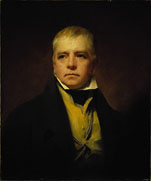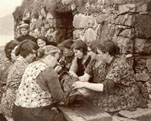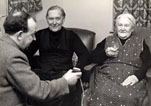Collaborative projects
Over the last five years, the department has initiated a number of large-scale projects which are shared with other universities.
The aim of these projects is to edit, and to render accessible through digitisation, large bodies of material which will act as foundations for, or catalysts towards, further research. Employing the latest forms of electronic technology, they are closely related, and reinforce one another in such a way as to create a contemporary Scottish research nexus of national and international significance.
Soillse

Soillse is a research collaboration between the University of the Highlands and Highlands, Aberdeen University, Edinburgh University and the University of Glasgow, and has been established to provide a much enhanced research capacity to inform public policy towards the maintenance and revitalisation of Gaelic language and culture in Scotland. The research funding budget of Soillse is £5.29 million. Soillse represent the largest ever investment in Gaelic language related research and is a unique pooling of resources by the academic institutions that are involved.
Soillse research builds on our existing work on Gaelic language policy and planning:
AHRC/DFG Walter Scott Minstrelsy of the Scottish Border Project

This is a joint project run between the University of Edinburgh and the Johannes Gutenberg University, Mainz. The UK side is funded by the Arts and Humanities Research Council (AHRC). The Principal Investigator is Professor Sigrid Rieuwerts.
The project runs from April 2011 to March 2014 and its overall aim is to produce a new critical edition of Walter Scott’s Minstrelsy of the Scottish Border. An educational website on the Minstrelsy and its ballads will also be available at the end of year 2 of the project.
Tobar an Dualchais/Kist O Riches

This major project, which is sustained by a £2.78 million grant from the Heritage Lottery Fund, is promoted by Edinburgh in partnership with the University of the Highlands and Islands Millennium Project, the British Broadcasting Corporation, and the National Trust for Scotland. Digitisation of, and electronic access to, archives held by the participating bodies is its principal objective. Some sixteen project posts have been created, most of which are based in the Highlands and Islands, and the principal staff members are now in position.
Calum Maclean Project

This major project, which is coordinated by Dr John Shaw, has been awarded a Resource Enhancement Grant (£300,000) by the Arts and Humanities Research Council - the first such grant to be awarded to the University of Edinburgh. It sustains two researcher assistants, the one based in Glasgow and the other in Edinburgh. Its main aim is to create an electronic catalogue of the contents of the manuscripts of stories and other material gathered by the folklore collector, Dr Calum Maclean, who worked in both Ireland and Scotland, and was one of the founding figures of the School of Scottish Studies. The Gaelic tale texts and reciters' autobiographies will be available electronically. The project is steered primarily at Edinburgh, with input from University College Dublin.
Faclair na Gàidhlig

Faclair na Gàidhlig: Tha an iomairt eadar-oilthigh seo anns a bheil Oilthighean Dhùn Èideann, Ghlaschu, Obar Dheathain, Srath Chluaidh agus Sabhal Mòr Ostaig OGE an sàs ag amas air faclair eachdraidheil de Ghàidhlig na h-Alba a chruthachadh. Thèid a dhealbh air prionnsapalan eachdraidheil coltach ris an fheadhainn air an deach Dictionary of the Older Scottish Tongue agus an Oxford English Dictionary a stèidheachadh.
Chaidh Faclair na Gàidhlig a chur air bhonn ann an 2003 agus tha e air ionmhas fhaotainn bho Bhòrd na Gàidhlig, Urras Charnegie, Urras Brosnachaidh na Gàidhlig, Urras Leverhulme, Riaghaltas na h-Alba, Chomhairle Maoineachaidh na h-Alba, Chomhairle Rannsachaidh nan Ealan ’s Eòlais Dhaonna agus Chomhairle an Rannsachaidh Shòisealta ’s Eaconamaich.
’S ann aig Sabhal Mòr Ostaig OGE a tha rianachd a’ phròiseict fo stiùireadh Proifeasair Boyd Robasdan, Prionnsapal Sabhal Mòr Ostaig OGE agus Neach-gairm Comataidh Stiùiridh Faclair na Gàidhlig.
Chaidh Ceum1 (2005-08) anns an robhar a’ cruthachadh bunait deasachaidh agus teacsa dhan fhaclair a dhèanamh aig Oilthigh Dhùn Èideann fo stiùireadh an Ollaimh Uilleam MacIllIosa agus an Ollaimh Dòmhnall Meek, Roinn na Ceiltis agus Eòlas na h-Alba
Ann an Ceum 2, cruthaichear stòr-dàta làn-theacsa de Ghàidhlig na h-Alba às an tèid am faclair a chur ri chèile. Tha am pròiseact seo air a stiùireadh leis an Ollamh Roibeard Ó Maolalaigh ann an Roinn na Ceiltis, Oilthigh Ghlaschu fo bhratach pròiseact an Data airson Stòras na Gàidhlig (DASG).
’S e pròiseact cudromach fad-ùine a th’ ann am Faclair na Gàidhlig a lìbhrigeas goireas a tha deatamach airson na cànain.
Gheibh sibh barrachd fiosrachaidh air làrach-lìn a’ phròiseict www.faclair.ac.uk
English Translation
Faclair na Gàidhlig: This inter-university initiative by the Universities of Aberdeen, Edinburgh, Glasgow, Strathclyde and Sabhal Mòr Ostaig UHI aims to produce an historical dictionary of Scottish Gaelic. It will be compiled on historical principles similar to those applied in the Dictionary of the Older Scottish Tongue and the Oxford English Dictionary.
Faclair na Gàidhlig was formally established in 2003 and has attracted funding from Bòrd na Gàidhlig, the Carnegie Trust, the Gaelic Language Promotion Trust, the Leverhulme Trust, the Scottish Government, the Scottish Funding Council, the Arts and Humanities Research Council and the Economic and Social Research Council.
The project is managed from Sabhal Mòr Ostaig UHI under the direction of Professor Boyd Robertson, Principal of the College and Convener of the Steering Committee.
Phase I (2005-08) to create the editorial and textual foundation for the dictionary was carried out at the University of Edinburgh under the direction of Professor Donald Meek and Professor William Gillies of Celtic & Scottish Studies.
Phase II will produce a full-text database of Scottish Gaelic from which the dictionary will be compiled. This project is directed by Professor R Ó Maolalaigh of the Department of Celtic, University of Glasgow under the auspices of the Digital Archive of Scottish Gaelic (DASG) project.
Faclair na Gàidhlig is a major long-term project which will produce an essential resource for the Gaelic language.
You can find more information on the project website www.faclair.ac.uk

